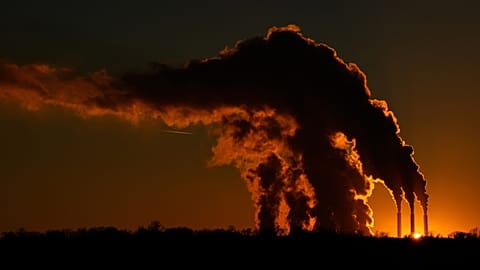Billionaires are responsible for vast amounts of greenhouse gas emissions. How could taxing them could help countries struggling with climate change.
When it comes to combatting the climate crisis, we all have a role to play.
 ADVERTISEMENT
ADVERTISEMENT
 ADVERTISEMENT
ADVERTISEMENT
From recycling to opting for plant-based meals and recycling to walking to work, there are plenty of ways individuals can reduce their carbon footprint.
But we aren't all equally responsible for global warming. Billionaires account for around a million times more greenhouse gases than the average person.
Taxing the ultra-rich could help mitigate some of the world impacts of climate change.
So how would such a tax work?
What could a tax on the rich pay for?
Several governments have toyed with the idea of a 'billionaire tax.' In his 2023 state of the union address in February, President Joe Biden suggested a 25 percent tax on all wealth over $100 million, estimated to apply to just 0.01 percent of Americans.
“We have to reward work, not just wealth,” he said.
This proposal is unlikely to gain much traction in a Republican-controlled congress. But studies have suggested that implemented globally, even a much smaller tax could help less wealthy countries deal with climate change.
An overhaul of national taxation systems - including a 1.5 per cent tax on individuals earning more than $100 million (€92 million) - could help rebalance the books, according to Climate Inequality Report.
The generated revenue would pay for climate adaptation in low-income countries - building resistant infrastructure and early warning systems, for example.
“Adaptation finance flows to developing countries reached US$29bn (€26bn) [in 2020]. Finance needs amount to about $200bn (€192 billion),” the report reads.
“A wealth tax on centimillionaires could generate US$295bn per year, enough to close the gap and generate additional revenues.”
Are the impacts of climate change distributed equally?
The top 10 per cent of global carbon emitters generate almost half of all greenhouse gas emissions, the report reads.
If emissions were equally distributed across the world, the average citizen of the Democratic Republic of Congo would see their emission levels increase tenfold.
Europeans and North Americans, meanwhile, would experience a drop in their emissions levels of almost 40 per cent and over 70 per cent respectively.
Yet the people who are least responsible for the climate crisis bear its worst impacts.
The bottom 50 per cent of the world population contributes 12 per cent of global emissions but is exposed to 75 per cent of relative income losses (income as a percentage of total income) due to climate change.
Nine of the ten countries exposed to the most significant risk of flooding are low or middle-income countries. The tenth - the Netherlands - can afford flood-resistant architecture.
These numbers can sound dry, but the real-world implications are catastrophic. When Pakistan was hit by floods in the 2022, 1,700 people were killed, while a further 20.6 million require humanitarian assistance.
“I have seen many humanitarian disasters in the world, but I have never seen climate carnage on this scale,” UN Secretary-General Antonio Guterres said.
Pakistan is responsible for just one per cent of global greenhouse gas emissions.
What are some tax-based solutions to global climate inequality?
The authors of the climate inequality report argue for progressive tax reform to rebalance the scales.
Their “relatively modest” proposal would see the world’s richest people taxed on a sliding scale.
Assets worth between $100 million (€92 million) and $1 billion (€920 million) would be taxed at 1.5 per cent.
Those between $1 billion (€920 million) and $100 billion (92 billion) would be taxed at 2 per cent, and assets above $100 billion at 3 per cent.
These taxes would apply to roughly 65,000 people - the number of people with assets more than $100 million (€92 million).
“Let us stress that at these levels of wealth, the per adult net wealth growth observed over the past two decades has been around 7-9 per cent per year,” the report authors state.
This means that the proposed tax would hardly decimate the bank accounts of the ultra-wealthy.
Nonetheless, it would raise nearly $300 billion (€275 billion) every year. This money would be invaluable for saving lives in developing countries.
The report's authors also call for excess profit taxes - so-called ‘windfall taxes’ on the massive amounts of money made by energy companies.
“Harvest the low-hanging fruit,” they write.


















